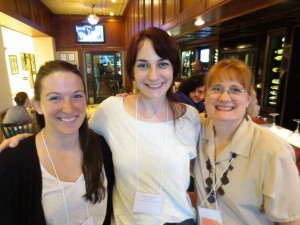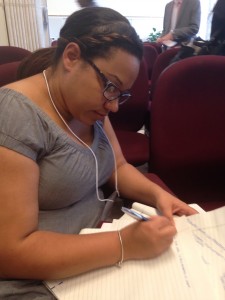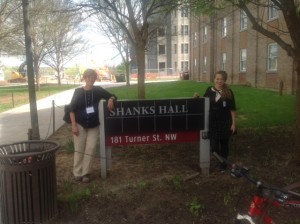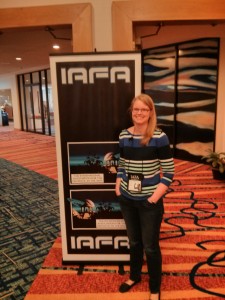English
South Eastern Medieval Association Conference 2015
 Over the summer I was offered the opportunity to submit an abstract for the annual South Eastern Medieval Association (SEMA) conference. My abstract was accepted and I spent the next several months developing a paper to present in Little Rock, Arkansas.
Over the summer I was offered the opportunity to submit an abstract for the annual South Eastern Medieval Association (SEMA) conference. My abstract was accepted and I spent the next several months developing a paper to present in Little Rock, Arkansas.
This was one of the most rewarding experiences I have had during my graduate career at Longwood. Not only was I given the opportunity to present my research, but I was able to spend three days meeting, and conversing, with some of the greatest scholars in my field. I spent my time at the conference sitting in on panel sessions, listening to the original research of established medievalists.
When it came time for me to present my paper, I was fortunate enough to be on a panel with Mary Leech from the University of Cincinnati and Tina Boyer from Wake Forest University (the two women in the picture with me). It was intimidating to be presenting alongside two established scholars, but they were nothing but supportive and encouraging.
One of the highlights of my trip was a morning session called “Breakfast with Chaucer.” This session was dedicated to the art of speaking Middle English. I was able to sit down with both experts and novices (like myself) and read aloud from Chaucer’s Canterbury Tales. This gave me the opportunity to practice Middle English and receive feedback from experts on how I could improve. This session is a perfect example of the community at this conference; experienced scholars making a point to help younger students learn to navigate the world of academia.
I’m so grateful to have been given the opportunity to attend SEMA. I made great connections and came back to Longwood inspired, and ready to dive back into my own thesis research.
Blue Ridge Symposium
 Having the opportunity to attend the Blue Ridge Symposium was really awesome. I was able to spend time with three professors in my discipline in addition to my class mate. Hearing Paul Matsuda speak enhanced the course materials related to his theoretical approach. My ability to apply the concepts from class was really improved by hearing the various speakers and having the chance to converse with colleagues.
Having the opportunity to attend the Blue Ridge Symposium was really awesome. I was able to spend time with three professors in my discipline in addition to my class mate. Hearing Paul Matsuda speak enhanced the course materials related to his theoretical approach. My ability to apply the concepts from class was really improved by hearing the various speakers and having the chance to converse with colleagues.
2015 Blue Ridge Symposium
 On April 18th, I had the privilege to attend the 2015 Blue Ridge Symposium at Virginia Tech. The original date in February was cancelled due to snow, but it was certainly worth the wait.
On April 18th, I had the privilege to attend the 2015 Blue Ridge Symposium at Virginia Tech. The original date in February was cancelled due to snow, but it was certainly worth the wait.
The symposium consisted of two keynote speakers, Paul Kei Matsuda and Alexis Hart, as well as a panel of graduate students attending (and teaching) at Virginia Tech. This year’s subject was diversity in the college classroom, first generation college students, and L2 learners (students whose first language is something other than English. This term is preferred to ESL generally, and I honestly agree with it because referring to a student as “ESL” prioritizes English over their first language–which shouldn’t be the case).
One of Matsuda’s major points regarded the myth of a homogenous university, and the importance of college instructors learning to accommodate the increase of L2 writers in the classroom. Also, understanding the different cultural values students will bring in and how that changes their perception. For instance, plagiarism. I have been warned about the repercussions of plagiarism throughout my education, but the ideas about intellectual integrity vary from culture to culture, thus, making it an even more complex issue to deal with in the classroom. Matsuda also suggested college instructors perhaps learn ways that they can accommodate L2 learners in their classroom, and I think he’s absolutely right in that.
Alexis Hart’s talk regarding student veterans was particularly compelling to me because I haven’t really thought about the diversity they contribute to a classroom, but thinking about it now they really do. Veteran students have very different experiences that will influence their presence in the classroom, as well as their approach to academic work. In my personal experience, friends of mine who are student veterans tend to be much more mature, however, as Hart’s talk emphasizes, it’s much more complex than that. She suggests that college instructors make sure student veterans know what resources their university has for them, both academically and emotionally. I really liked her suggestions for college instructors as far as accommodating veteran students. One that I particularly liked was to have the syllabus available before the course begins so they can know what they’re in for, particularly if the class plans to cover something triggering they can drop the class, or speak to the professor in advance.
One of my favorite suggestions for helping L2 learners’ writing process is to allow them to pre-write and draft in their first language, and then to write their final papers in English. Matsuda also suggests allowing students to use academic sources in other languages.
Many thanks to my professor, Dr. Lettner-Rust, for such a great opportunity! I certainly learned a lot about what to consider for my own future classrooms. Also, free books! Who wouldn’t love a conference with free books?
International Conference for the Fantastic in the Arts
 Last week, I had the opportunity to attend the International Conference for the Fantastic in the Arts in Orlando, Florida. Described by a friend as “ComicCon for scholars,” ICFA is an academic conference for the study of science fiction, fantasy, and horror. The conference offers a wide range of panels, author talks, and book signings. At this conference, I presented a paper with the Children’s and Young Adult Division titled “The Problematics of Magical Girl Feminism.” My paper discussed magical girl manga such as Sailor Moon, and explored the ways that these texts attempt to portray empowered female characters while really just reinforcing traditional ideology about women. The paper was a real joy to present, and appeared well received by those in attendance.
Last week, I had the opportunity to attend the International Conference for the Fantastic in the Arts in Orlando, Florida. Described by a friend as “ComicCon for scholars,” ICFA is an academic conference for the study of science fiction, fantasy, and horror. The conference offers a wide range of panels, author talks, and book signings. At this conference, I presented a paper with the Children’s and Young Adult Division titled “The Problematics of Magical Girl Feminism.” My paper discussed magical girl manga such as Sailor Moon, and explored the ways that these texts attempt to portray empowered female characters while really just reinforcing traditional ideology about women. The paper was a real joy to present, and appeared well received by those in attendance.
During the rest of the conference, I attended a wide range of panels, from “Buffy, Star Trek, and Pedagogy” to “Science Fiction Fan Worlds.” I saw friends and colleagues present on Disney and body image, tomboys in Anne Radcliffe’s Gothic novels, and video games and urban legends. Perhaps one of the most meaningful panels, “Teaching Science Fiction and Fantasy in Community College,” brought together three scholars to discuss their experiences incorporating genre fiction into their community college classrooms. As I prepare to go on the job market with the hopes of securing a teaching position at a small university or community college, their insight was invaluable. Besides the scholarly panels, I attended a lovely reading by Peter Straub, had a copy of Steven Erikson’s Willful Child signed, reunited with some friends from Longwood and Hollins University, and spent far too much money in the book room.
The first time I presented at ICFA as an undergrad, I came home with thoughts of building a career in academia. This trip has reminded me why I felt that way. While science fiction, fantasy, and horror are becoming more prevalent in popular culture, there is still a stigma associated with studying those fields from a critical perspective. ICFA is an opportunity to not only enjoy time with other scholars who share my interests, but to see their success stories. All of the people I met have built careers pursing a field of study that I am passionate about, and being immersed in their work reminds me just what a meaningful pursuit genre studies really is. Science fiction, fantasy, and horror explore humanity’s wildest dreams and darkest fears. They reflect who we are and imagine who we could be. On days when I feel unsure about the field of study I’ve chosen, opportunities like ICFA remind me why I do what I do, and why I never want to stop.
-Jessica Stanley